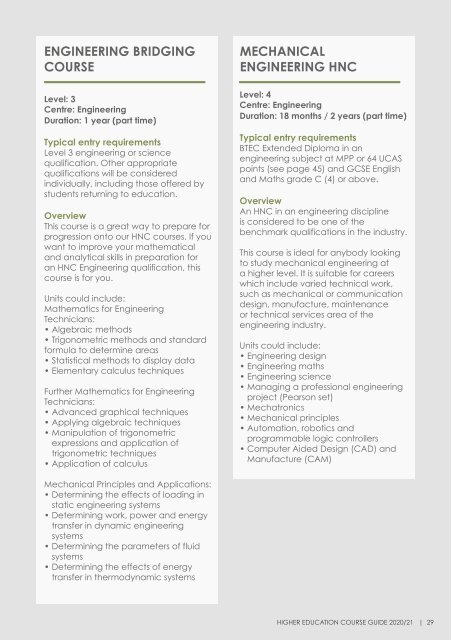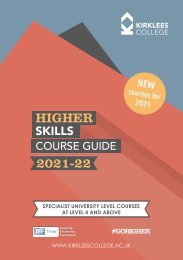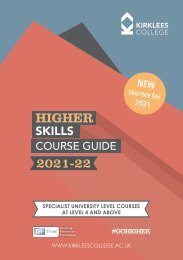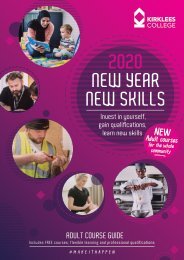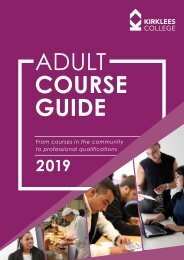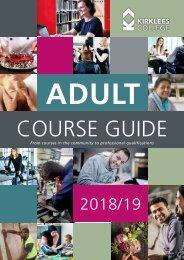Higher Education Course Guide 2020-2021
Create successful ePaper yourself
Turn your PDF publications into a flip-book with our unique Google optimized e-Paper software.
ENGINEERING BRIDGING<br />
COURSE<br />
Level: 3<br />
Centre: Engineering<br />
Duration: 1 year (part time)<br />
Typical entry requirements<br />
Level 3 engineering or science<br />
qualification. Other appropriate<br />
qualifications will be considered<br />
individually, including those offered by<br />
students returning to education.<br />
Overview<br />
This course is a great way to prepare for<br />
progression onto our HNC courses. If you<br />
want to improve your mathematical<br />
and analytical skills in preparation for<br />
an HNC Engineering qualification, this<br />
course is for you.<br />
Units could include:<br />
Mathematics for Engineering<br />
Technicians:<br />
• Algebraic methods<br />
• Trigonometric methods and standard<br />
formula to determine areas<br />
• Statistical methods to display data<br />
• Elementary calculus techniques<br />
Further Mathematics for Engineering<br />
Technicians:<br />
• Advanced graphical techniques<br />
• Applying algebraic techniques<br />
• Manipulation of trigonometric<br />
expressions and application of<br />
trigonometric techniques<br />
• Application of calculus<br />
MECHANICAL<br />
ENGINEERING HNC<br />
Level: 4<br />
Centre: Engineering<br />
Duration: 18 months / 2 years (part time)<br />
Typical entry requirements<br />
BTEC Extended Diploma in an<br />
engineering subject at MPP or 64 UCAS<br />
points (see page 45) and GCSE English<br />
and Maths grade C (4) or above.<br />
Overview<br />
An HNC in an engineering discipline<br />
is considered to be one of the<br />
benchmark qualifications in the industry.<br />
This course is ideal for anybody looking<br />
to study mechanical engineering at<br />
a higher level. It is suitable for careers<br />
which include varied technical work,<br />
such as mechanical or communication<br />
design, manufacture, maintenance<br />
or technical services area of the<br />
engineering industry.<br />
Units could include:<br />
• Engineering design<br />
• Engineering maths<br />
• Engineering science<br />
• Managing a professional engineering<br />
project (Pearson set)<br />
• Mechatronics<br />
• Mechanical principles<br />
• Automation, robotics and<br />
programmable logic controllers<br />
• Computer Aided Design (CAD) and<br />
Manufacture (CAM)<br />
Mechanical Principles and Applications:<br />
• Determining the effects of loading in<br />
static engineering systems<br />
• Determining work, power and energy<br />
transfer in dynamic engineering<br />
systems<br />
• Determining the parameters of fluid<br />
systems<br />
• Determining the effects of energy<br />
transfer in thermodynamic systems<br />
HIGHER EDUCATION COURSE GUIDE <strong>2020</strong>/21 | 29


